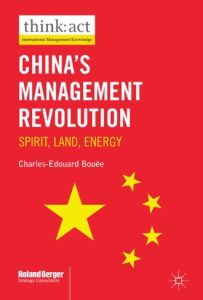Join getAbstract to access the summary!

Join getAbstract to access the summary!
Charles-Edouard Bouée
China's Management Revolution
Spirit, Land, Energy
Palgrave Macmillan, 2011
What's inside?
The riddle of Chinese business management revealed – for Westerners, by a Westerner
Recommendation
To many Westerners, China represents the impenetrable East. From its diverse languages and its ancient philosophies to its modern-day economic boom, China simultaneously tantalizes and perplexes Westerners, particularly in the way it conducts business. The Chinese management model, with its emphasis on harmony and reciprocity, and its lack of long-range strategic planning, often makes little sense to Westerners. That’s all the more reason to send kudos to Shanghai-based business consultant Charles-Edouard Bouée for this outstanding job of explaining the Chinese system to Westerners. His informed analysis, though dry in parts and somewhat repetitive, provides an important context for understanding how the globe’s most populous nation will thrive in the future. China seems poised to set the world’s economic pace, and getAbstract believes Bouée’s book is a great place to start learning about how China does business.
Summary
About the Author
Charles-Edouard Bouée is the president of Roland Berger Strategy Consultants Asia. He advises some of the most well-known organizations in China. In 2010, the Shanghai Municipal Government presented Bouée with its Magnolia Award for his civic contributions and leadership.
















Comment on this summary